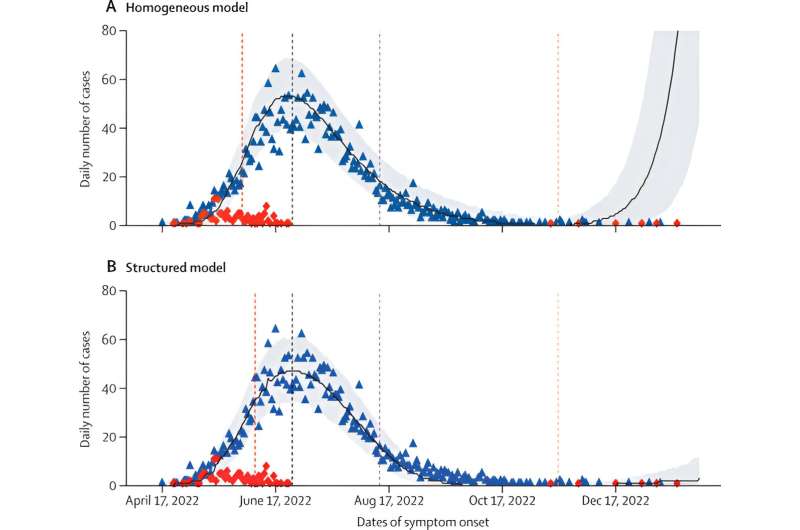This article has been reviewed according to Science X's editorial process and policies. Editors have highlighted the following attributes while ensuring the content's credibility:
fact-checked
peer-reviewed publication
trusted source
proofread
Study: Reductions in sexual mixing ended mpox outbreak in England, vaccination prevented resurgences in 2023

The rapid outbreak of mpox (formerly known as monkeypox) in 2022 likely resulted from high levels of sexual mixing among some gay, bisexual and other men who have sex with men (GBMSM), with the initial downturn in cases probably due to a reduction in sexual contacts among these men, according to new research led by the National Institute for Health and Care Research (NIHR) Health Protection Research Unit (HPRU) in Behavioral Science and Evaluation. The HPRU is a partnership between the University of Bristol and the UK Health Security Agency (UKHSA).
The paper, published in The Lancet Infectious Diseases 11 September, also found that the scale-up in vaccination did not contribute much to the initial downturn in cases, although the very small number of cases in 2023 is likely due to sufficiently high vaccination coverage to prevent a widespread resurgence in cases.
The 2022 global mpox outbreak spread among GBMSM, with the World Health Organization (WHO) declaring the outbreak a Public Health Emergency of International Concern on 23 July 2022.
The paper describes the results of mathematical modeling to understand the epidemiological characteristics of the mpox outbreak in England, and what contributed to the outbreak ending, to help prevent and control future outbreaks.
The authors used anonymous data from more than 3,000 mpox cases in England between 1 May and 16 November 2022. Using multiple data sources from these cases as well as data on the number of vaccinations provided the authors carried out a number of detailed analyses of the English outbreak.
Mathematical modeling undertaken by the team estimated that most infections were among a small subgroup of GBMSM at higher risk for mpox, with the outbreak's initial decline probably due to a 45% reduction in the sexual partner rate and a 20% decrease in the time that people were infectious, resulting from improvements in diagnosis and isolation. These changes, partially resulting from UKHSA, NHS and community partners' extensive health promotion and awareness raising, prevented 165,896 infections by 16 November 2022.
Vaccination of GBMSM at high risk of mpox, which started on 27 June 2022, is estimated to have had less impact on the outbreak's initial decline, but may have prevented a resurgence in cases from January 2023.
Peter Vickerman, Professor of Infectious Disease Modeling from the Bristol Medical School's Population Health Sciences and NIHR Health Protection Research Unit (NIHR HPRU), and the paper's corresponding author, said, "Reductions in sexual risk behavior among GBMSM at high risk of mpox, together with prompt diagnosis and isolation of people with mpox, can reduce the spread of an mpox outbreak to low levels."
Sema Mandal, Medical Consultant Epidemiologist in the UKHSA Blood Safety, Hepatitis, STI and HIV Division, and the UKHSA's senior author added "While the initial decline in cases was due to less sexual mixing, vaccination among GBMSM at highest risk of mpox has contributed to sustained low numbers of mpox cases and likely prevented a resurgence. Vaccination was key to reducing the severity of symptoms and preventing further transmission. It's important to remember that while mpox case numbers across England remain very low, we are not complacent and stand ready to respond to any significant rise in cases."
The authors highlight the need for more evidence on the protection provided by vaccination in terms of the strength of effect and duration of protection. This is especially important because of emerging evidence that new infections have been occurring among people that have been fully vaccinated.
More information: Xu-Sheng Zhang et al, Transmission dynamics and effect of control measures on the 2022 outbreak of mpox among gay, bisexual, and other men who have sex with men in England: a mathematical modelling study, The Lancet Infectious Diseases (2023). DOI: 10.1016/S1473-3099(23)00451-6




















